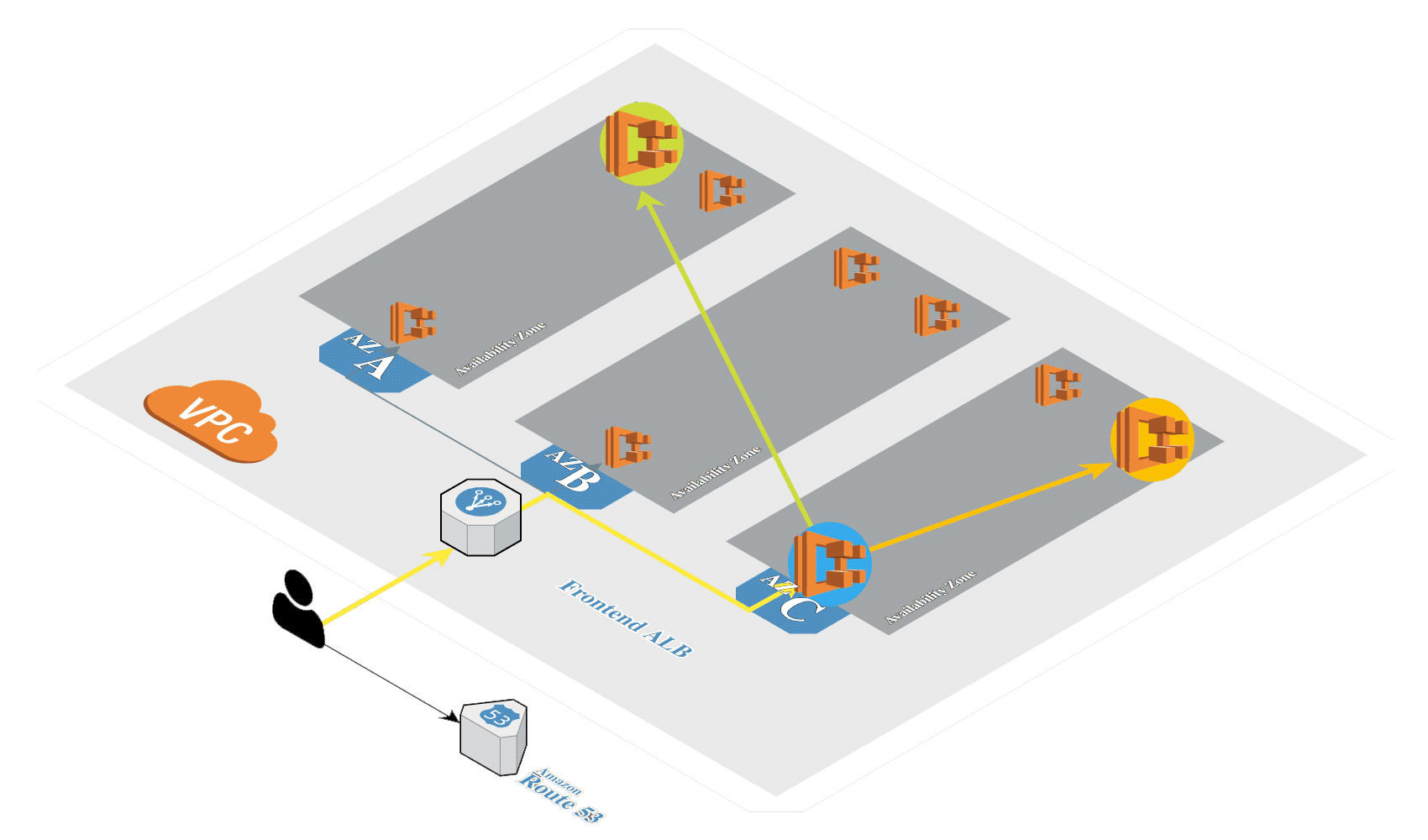Create additional AWS structure
Create Route53
Create CloudFormation template containing policies for Route53, S3 access (Harbor, Velero) and Domain.
Put new domain CLUSTER_FQDN to the Route 53 and configure the DNS delegation from the BASE_DOMAIN.
Create Route53 zone:
cat > "tmp/${CLUSTER_FQDN}/cf-route53.yml" << \EOF
AWSTemplateFormatVersion: 2010-09-09
Description: Route53 entries
Parameters:
BaseDomain:
Description: "Base domain where cluster domains + their subdomains will live. Ex: k8s.mylabs.dev"
Type: String
ClusterFQDN:
Description: "Cluster FQDN. (domain for all applications) Ex: kube1.k8s.mylabs.dev"
Type: String
Resources:
HostedZone:
Type: AWS::Route53::HostedZone
Properties:
Name: !Ref ClusterFQDN
RecordSet:
Type: AWS::Route53::RecordSet
Properties:
HostedZoneName: !Sub "${BaseDomain}."
Name: !Ref ClusterFQDN
Type: NS
TTL: 60
ResourceRecords: !GetAtt HostedZone.NameServers
S3Bucket:
Type: AWS::S3::Bucket
Properties:
AccessControl: Private
BucketName: !Sub "${ClusterFQDN}"
BucketEncryption:
ServerSideEncryptionConfiguration:
- ServerSideEncryptionByDefault:
SSEAlgorithm: AES256
EOF
if [[ $(aws cloudformation list-stacks --stack-status-filter CREATE_COMPLETE --query "StackSummaries[?starts_with(StackName, \`${CLUSTER_NAME}-route53\`) == \`true\`].StackName" --output text) == "" ]]; then
# shellcheck disable=SC2001
eval aws cloudformation "create-stack" \
--parameters "ParameterKey=BaseDomain,ParameterValue=${BASE_DOMAIN} ParameterKey=ClusterFQDN,ParameterValue=${CLUSTER_FQDN}" \
--stack-name "${CLUSTER_NAME}-route53" \
--template-body "file://tmp/${CLUSTER_FQDN}/cf-route53.yml" \
--tags "$(echo "${TAGS}" | sed -e 's/\([^ =]*\)=\([^ ]*\)/Key=\1,Value=\2/g')" || true
fi
Create Amazon EKS

Create Amazon EKS in AWS by using eksctl.

Create the Amazon EKS cluster with Calico using eksctl:
cat > "tmp/${CLUSTER_FQDN}/eksctl-${CLUSTER_NAME}.yaml" << EOF
apiVersion: eksctl.io/v1alpha5
kind: ClusterConfig
metadata:
name: ${CLUSTER_NAME}
region: ${AWS_DEFAULT_REGION}
version: "1.21"
tags: &tags
$(echo "${TAGS}" | sed "s/ /\\n /g; s/^/ /g; s/=/: /g")
iam:
withOIDC: true
serviceAccounts:
- metadata:
name: aws-load-balancer-controller
namespace: aws-load-balancer
wellKnownPolicies:
awsLoadBalancerController: true
- metadata:
name: cert-manager
namespace: cert-manager
wellKnownPolicies:
certManager: true
- metadata:
name: cluster-autoscaler
namespace: cluster-autoscaler
wellKnownPolicies:
autoScaler: true
- metadata:
name: external-dns
namespace: external-dns
wellKnownPolicies:
externalDNS: true
- metadata:
name: ebs-csi-controller-sa
namespace: aws-ebs-csi-driver
wellKnownPolicies:
ebsCSIController: true
- metadata:
name: efs-csi-controller-sa
namespace: aws-efs-csi-driver
wellKnownPolicies:
efsCSIController: true
- metadata:
name: kustomize-controller
namespace: flux-system
attachPolicy:
Version: 2012-10-17
Statement:
- Sid: FluxKMS
Effect: Allow
Action:
- kms:Encrypt
- kms:Decrypt
- kms:ReEncrypt*
- kms:GenerateDataKey*
- kms:DescribeKey
Resource:
- ${AWS_KMS_KEY_ARN}
- metadata:
name: kuard-sa
namespace: kuard
attachPolicy:
Version: 2012-10-17
Statement:
- Sid: AllowSecretManagerAccess
Effect: Allow
Action:
- secretsmanager:GetSecretValue
Resource:
- arn:*:secretsmanager:*:*:secret:*
- Sid: AllowKMSAccess
Effect: Allow
Action:
- kms:Decrypt
Resource:
- ${AWS_KMS_KEY_ARN}
Condition:
StringLike:
kms:ViaService:
- secretsmanager.*.amazonaws.com
- metadata:
name: velero
namespace: velero
attachPolicy:
Version: 2012-10-17
Statement:
- Effect: Allow
Action:
- s3:ListBucket
Resource:
- arn:aws:s3:::${CLUSTER_FQDN}
- Effect: Allow
Action:
- s3:PutObject
- s3:GetObject
- s3:DeleteObject
- s3:ListMultipartUploadParts
- s3:AbortMultipartUpload
Resource:
- arn:aws:s3:::${CLUSTER_FQDN}/*
vpc:
id: "${AWS_VPC_ID}"
subnets:
private:
${AWS_DEFAULT_REGION}a:
id: "${AWS_PRIVATESUBNETID1}"
${AWS_DEFAULT_REGION}b:
id: "${AWS_PRIVATESUBNETID2}"
public:
${AWS_DEFAULT_REGION}a:
id: "${AWS_PUBLICSUBNETID1}"
${AWS_DEFAULT_REGION}b:
id: "${AWS_PUBLICSUBNETID2}"
managedNodeGroups:
- name: managed-ng-1
amiFamily: Bottlerocket
instanceType: t3.large
desiredCapacity: 3
minSize: 2
maxSize: 5
volumeSize: 30
tags:
<<: *tags
compliance:na:defender: bottlerocket
volumeEncrypted: true
volumeKmsKeyID: ${AWS_KMS_KEY_ID}
disableIMDSv1: true
secretsEncryption:
keyARN: ${AWS_KMS_KEY_ARN}
gitops:
flux:
gitProvider: github
flags:
owner: "${GITHUB_USER}"
repository: "${GITHUB_FLUX_REPOSITORY}"
personal: "true"
private: "false"
branch: "main"
path: "clusters/${ENVIRONMENT}/${CLUSTER_FQDN}"
EOF
if [[ ! -s "${KUBECONFIG}" ]]; then
if ! eksctl get clusters --name="${CLUSTER_NAME}" &> /dev/null; then
eksctl create cluster --config-file "tmp/${CLUSTER_FQDN}/eksctl-${CLUSTER_NAME}.yaml" --kubeconfig "${KUBECONFIG}"
else
eksctl utils write-kubeconfig --cluster="${CLUSTER_NAME}" --kubeconfig "${KUBECONFIG}"
fi
fi
Add add the user or role to the aws-auth ConfigMap. This is handy if you are using different user for CLI operations and different user/role for accessing the AWS Console to see EKS Workloads in Cluster's tab.
if [[ -n ${AWS_CONSOLE_ADMIN_ROLE_ARN+x} ]] && ! eksctl get iamidentitymapping --cluster="${CLUSTER_NAME}" --arn="${AWS_CONSOLE_ADMIN_ROLE_ARN}" &> /dev/null; then
eksctl create iamidentitymapping --cluster="${CLUSTER_NAME}" --arn="${AWS_CONSOLE_ADMIN_ROLE_ARN}" --group system:masters --username admin
fi
if [[ -n ${AWS_USER_ROLE_ARN+x} ]] && ! eksctl get iamidentitymapping --cluster="${CLUSTER_NAME}" --arn="${AWS_USER_ROLE_ARN}" &> /dev/null; then
eksctl create iamidentitymapping --cluster="${CLUSTER_NAME}" --arn="${AWS_USER_ROLE_ARN}" --group system:masters --username admin
fi
Post installation tasks
Change TTL=60 of SOA + NS records for new domain (it can not be done in CloudFormation):
if [[ ! -s "tmp/${CLUSTER_FQDN}/route53-hostedzone-ttl.yml" ]]; then
aws cloudformation wait stack-create-complete --stack-name "${CLUSTER_NAME}-route53"
HOSTED_ZONE_ID=$(aws route53 list-hosted-zones --query "HostedZones[?Name==\`${CLUSTER_FQDN}.\`].Id" --output text)
RESOURCE_RECORD_SET_SOA=$(aws route53 --output json list-resource-record-sets --hosted-zone-id "${HOSTED_ZONE_ID}" --query "(ResourceRecordSets[?Type == \`SOA\`])[0]" | sed "s/\"TTL\":.*/\"TTL\": 60,/")
RESOURCE_RECORD_SET_NS=$(aws route53 --output json list-resource-record-sets --hosted-zone-id "${HOSTED_ZONE_ID}" --query "(ResourceRecordSets[?Type == \`NS\`])[0]" | sed "s/\"TTL\":.*/\"TTL\": 60,/")
cat << EOF | jq > "tmp/${CLUSTER_FQDN}/route53-hostedzone-ttl.yml"
{
"Comment": "Update record to reflect new TTL for SOA and NS records",
"Changes": [
{
"Action": "UPSERT",
"ResourceRecordSet":
${RESOURCE_RECORD_SET_SOA}
},
{
"Action": "UPSERT",
"ResourceRecordSet":
${RESOURCE_RECORD_SET_NS}
}
]
}
EOF
aws route53 change-resource-record-sets --output json --hosted-zone-id "${HOSTED_ZONE_ID}" --change-batch="file://tmp/${CLUSTER_FQDN}/route53-hostedzone-ttl.yml"
fi